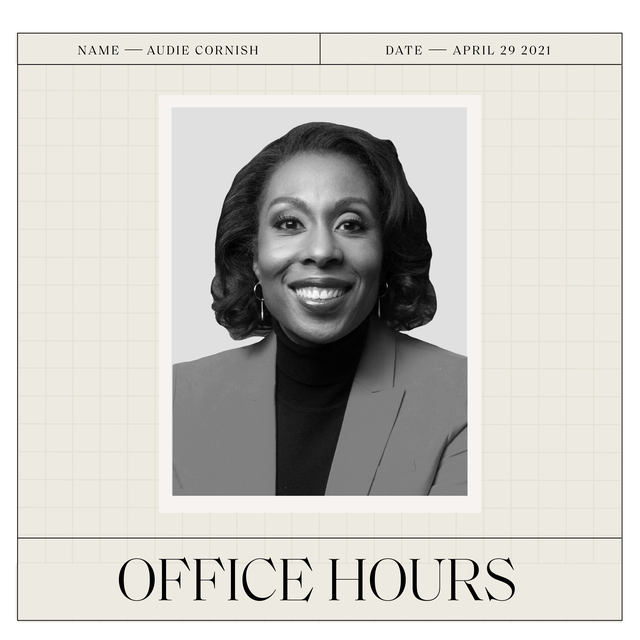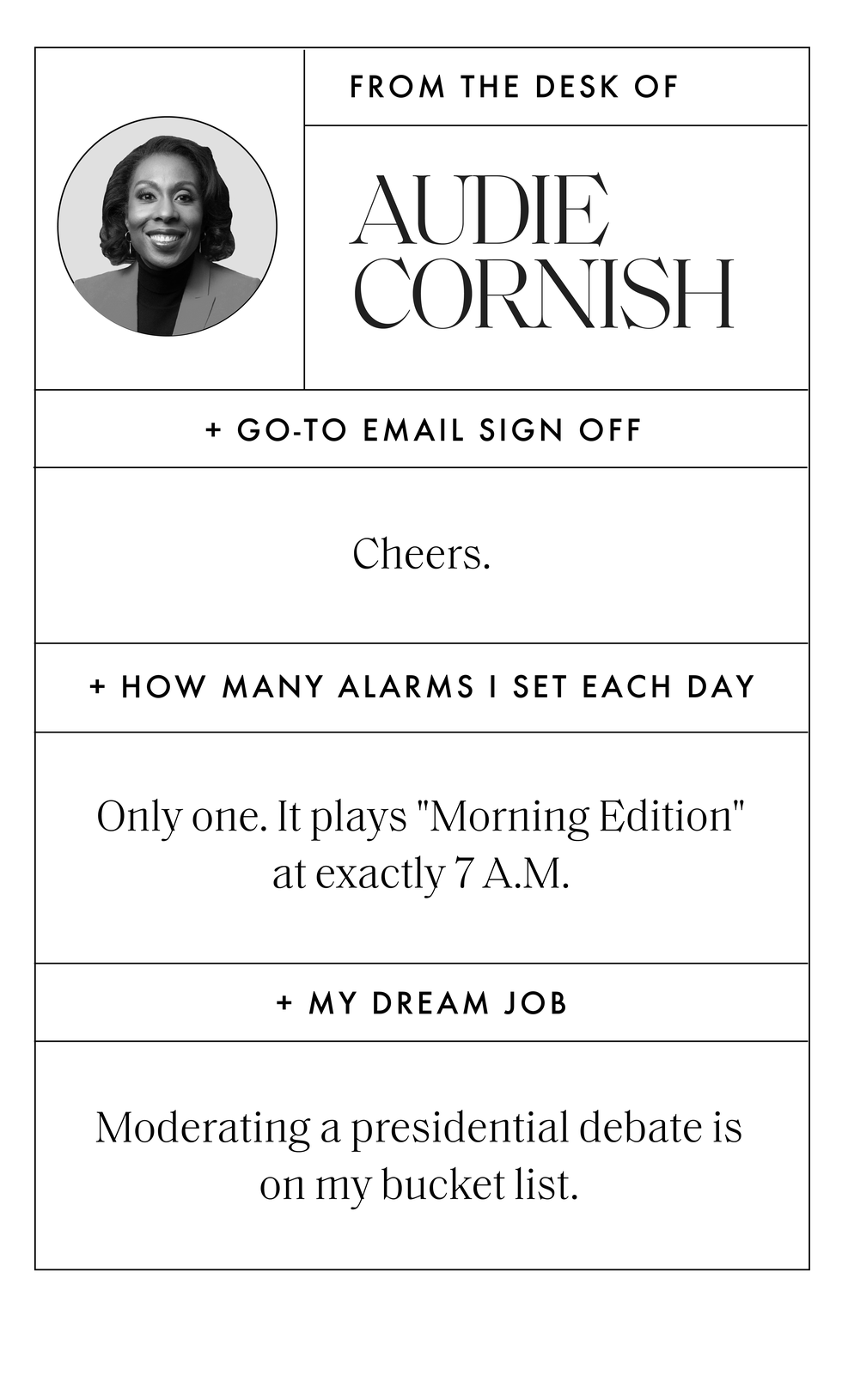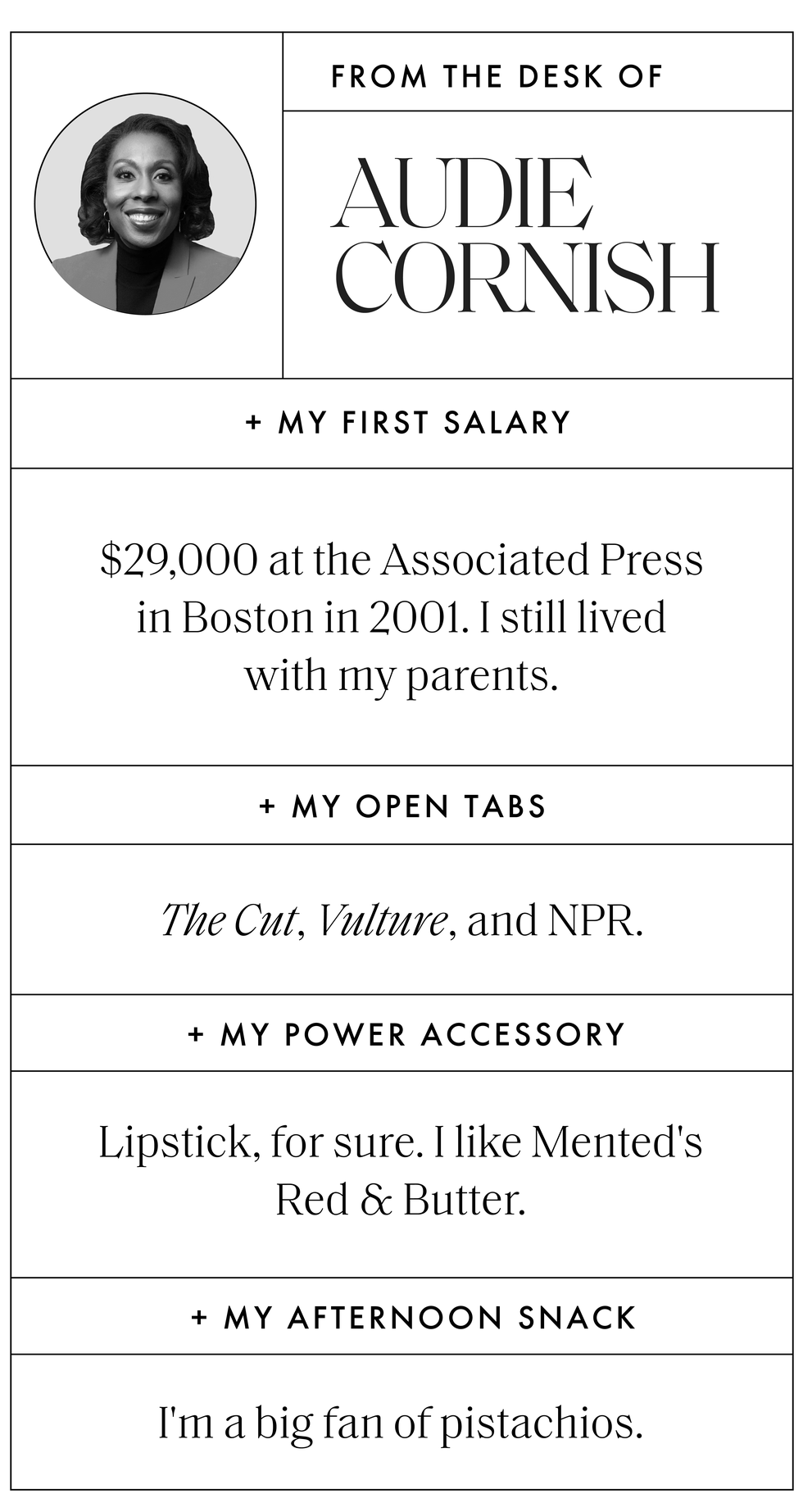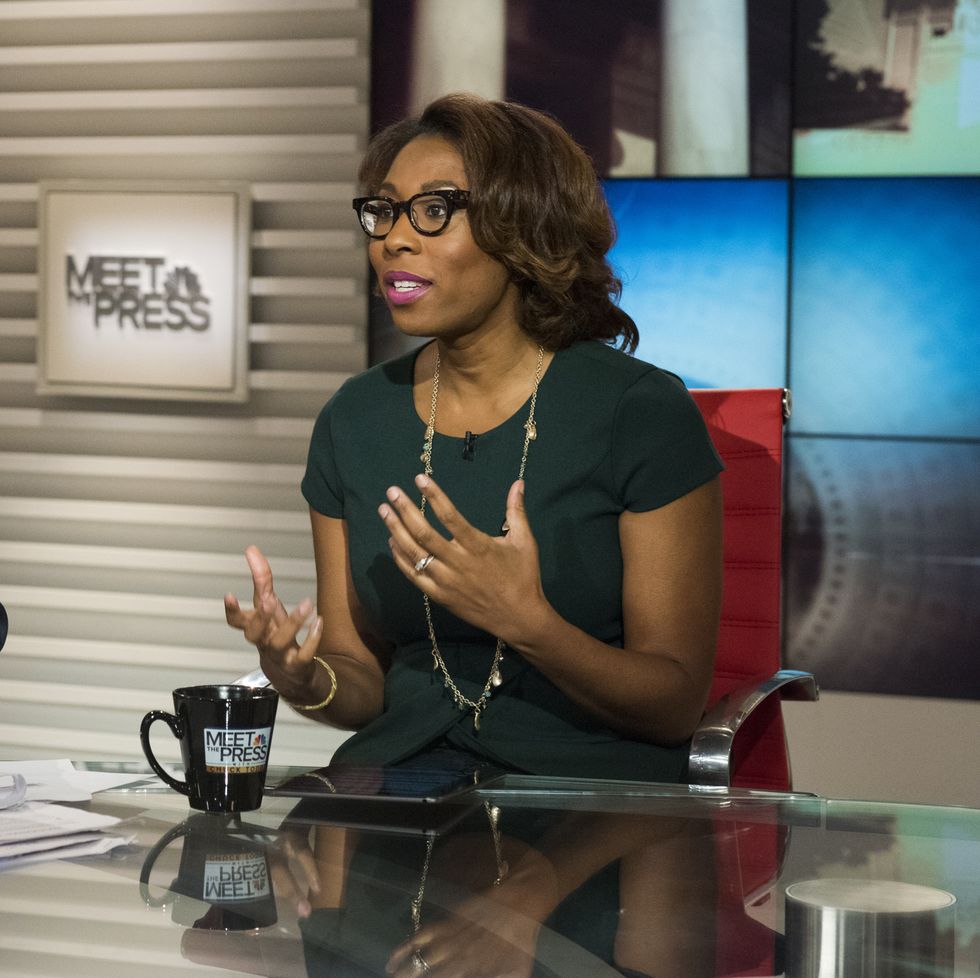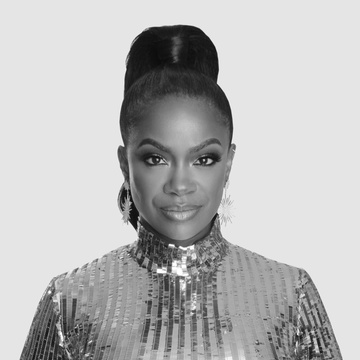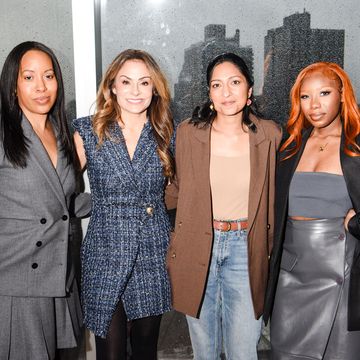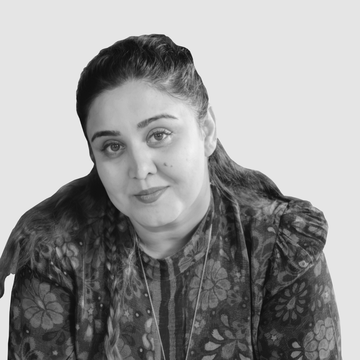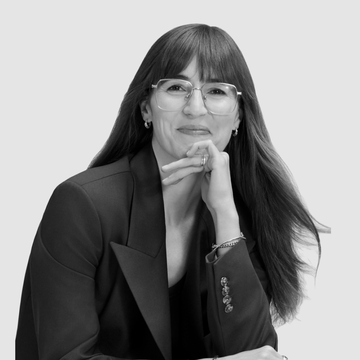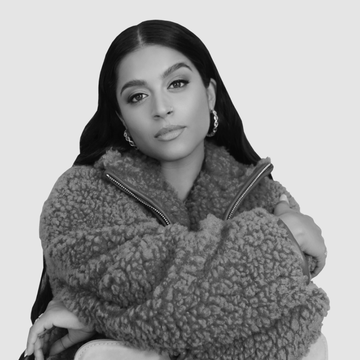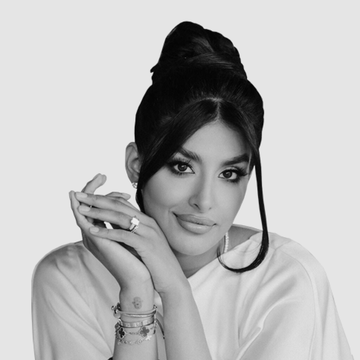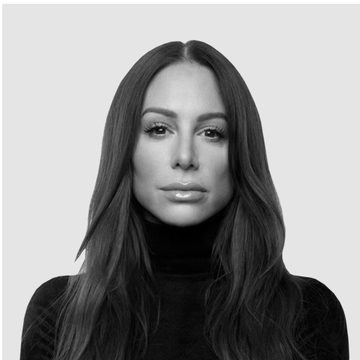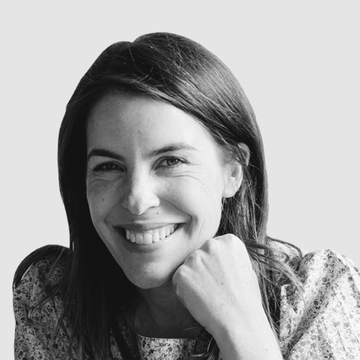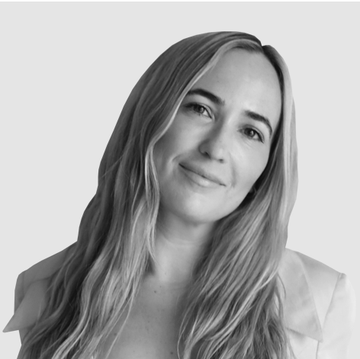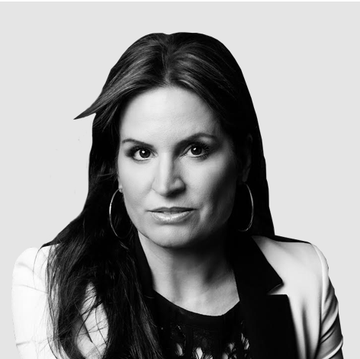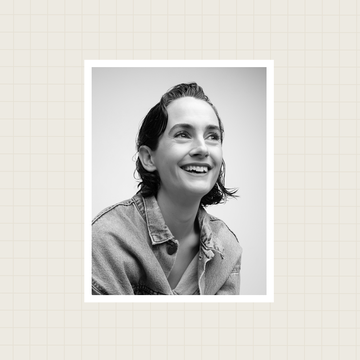In ELLE.com's monthly series Office Hours, we ask people in powerful positions to take us through their first jobs, worst jobs, and everything in between. This month, we spoke with Audie Cornish, the award-winning co-host of NPR's renowned news program All Things Considered, in honor of the show's upcoming 50th anniversary. Below, the media veteran shares why she once felt like the “last dinosaur” of journalism, the lipstick she turns to for important moments, and the warning she has for working mothers.
My first job ever
My first job was in a bagel bakery in my tiny Massachusetts town when I was 13 or 14. I boxed up rugelach and sliced bagels for people for a summer, and I used my first paycheck to buy rollerblades. [In] customer service, you're definitely there to serve an audience one way or another and to listen. Lots of people came in and just liked to chat. That was fun. I was really young, and you're not used to talking to adults in that way.
How I got over imposter syndrome
I used to feel imposter syndrome so strongly. Then I turned 40 and thought, This isn't cute anymore. How long can I pretend not to know what I'm doing? I actually really know what I'm doing. So many people talk about imposter syndrome now that, I have to say, do we all really have it? It's supposed to be something you privately believe. But if everyone feels it, and everyone knows everyone feels it, we're just a bunch of insecure, scared people trying to figure out how to keep our heads above water. At least we're in it together. If I told myself I didn't belong in every room where I felt alone or alienated or misrepresented or didn't see anyone who looked like me, I would never advance in this industry.
How I've navigated changes in media
There was a time where I really thought I'd miscalculated because I was this nerdy local reporter doing radio, and all my other young journalist friends were in New York writing for blogs. It was the Gawker crowd, and everyone was cooler. It was very like, we're snappy. We're ironic. Everyone else is doing meaningless trash because we're sticking it to everyone. I'm like, I guess I'll just cover 9/11. It felt like I was the last dinosaur. Now, over the last couple of years, everyone and their mother has a podcast. Everyone is basically just doing radio.
Now the journalism trend I think we're all struggling with in some way is the idea that a journalist's own personal brand is as, or more, important than the news organization they're working for. I think people should be recognized when they do great work. The flip side is I don't want to be an influencer. I'm not a celebrity. You're supposed to go on TV all the time, tweet, Instagram, TikTok. I don't do any of that, and it hurts my career. At the end of my work day, I need a glass of wine and my children to be very quiet. I don't need to get on Clubhouse and talk to some third congressman from the right. That seems very depressing to me.
My identity crisis when I became a working mom
Because it took so long for me to have kids, you have people who love to comment and say, “You're not going to want to travel and do all this crazy stuff, blah blah.” The truth is I still wanted to do those things, even when I couldn't. It caused an identity crisis in a way, because I wasn't ready to be stripped of those things. I didn't want to resent my child, but when you're dealing with postpartum and having all kinds of depressive thoughts, that's the kind of thing that weighs on you. In my case, I had a lot of co-hosts who I thought were really advancing while I was stuck pushing out kids. Even though I liked these kids, that meant I wasn't going to North Korea. I had to adjust my expectations about what success would look like and what I can still do to showcase my own talent.
My best advice for negotiating
When it comes to what I would call compensation, salary isn't the only thing to ask for. Sometimes you're not in a position to get that pay bump, and you really need to ask for the other kinds of benefits you could be getting. Maybe that's your vacation. Maybe that's how you get assignments or projects. Ask around your industry. What are the perks you see people getting that you wish you could have? There might be other ways you can use the job you're in to set you up for the next one, rather than spending all your time trying to squeeze money out of your bosses.
The lesson I learned the hard way
After I had babies, I pulled the full Beyoncé. I got two other jobs. I was like, look at me, doing all the things. I'm awesome. Then immediately after, I was like, why did I do that? My hair was falling out, and I was so stressed. I realized I was trying to prove to everyone, and myself, that “I still got it.” I want to warn people: Don't do that. Remember at the end of Homecoming, Beyoncé even says, “I don't think I'm going to do that again.” Here's the trick: You will be rewarded for working like an animal, but you also will be treated like an animal. People will keep hurling things at you. No one is going to ask you if you need help. No one's going to ask you if it's time to stop. When you're really ambitious, the only thing that's going to stop anything is you.
This interview has been lightly edited and condensed for clarity.
